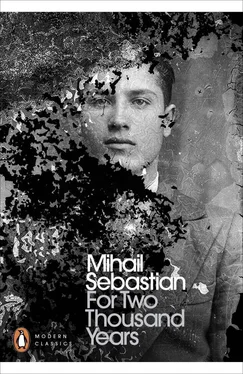He didn’t reply. He reflected for a moment, hesitating, a little embarrassed, as though he wished to change the subject. Then, probably after brief private deliberation, he addressed me in that determined manner people have when they want to get something off their chests.
‘You’re right. Yet there is a Jewish problem, and it needs to be solved. One million eight hundred thousand Jews is intolerable. If it was up to me, I’d try to eliminate several hundred thousand.’
I was startled. I think I failed to hide my surprise. The one person I had believed utterly incapable of anti-Semitism was he — Mircea Vieru. So, him too. He noticed my distress and hurried to explain.
‘Let’s be clear. I’m not anti-Semitic. I’ve told you that before and abide by that. But I’m Romanian. And, all that is opposed to me as a Romanian I regard as dangerous. There is a corrosive Jewish spirit. I must defend myself against it. In the press, in finance, in the army — I feel it exerting its influence everywhere. If the body of our state were strong, it would hardly bother me. But it’s not strong. It’s sinful, corruptible and weak. And this is why I must fight against the agents of corruption.’
I said nothing for a few seconds, which was not what he had expected. I could have responded, out of politeness, to keep the conversation going, but I failed to.
‘Do I surprise you?’
‘No, you depress me. You see, I know two kinds of anti-Semites. Ordinary anti-Semites — and anti-Semites with arguments. I manage to get along with the first kind, because everything between us is clear-cut. But with the other kind it’s hard.’
‘Because it’s hard to argue back?’
‘Because it’s futile to argue back. You see, dear master, your mistake begins where your arguments begin. To be anti-Semitic is a fact. To be anti-Semitic with arguments — that’s a waste of time, a dead end. Neither your anti-Semitism nor Romanian anti-Semitism has need of arguments. Let’s say I could answer those arguments. What then? Would that clarify anything? Taking into account that all the possible accusations against Romanian Jews are just local issues, while anti-Semitism is universal and eternal. You don’t find anti-Semites only in Romania. They’re also in Germany, Hungary, Greece, France and America — all, absolutely all, in the context of interests, with their own methods, with their own temperaments. And there haven’t only been anti-Semites now, after the war, there were anti-Semites before the war, and not just in this century, but in the last one and all the others. What’s happening today is a joke compared to what happened in 1300.
‘So, if anti-Semitism is indeed such a persistent general fact, isn’t it useless to seek specific Romanian causes? Political causes today, economic causes yesterday, religious causes before that — the causes are too numerous and too specific to explain such a general historical fact.’
‘You’re very crafty,’ interrupted Vieru. ‘Aren’t you trying to make anti-Semitism inexplicable by making it eternal? And declaring Jews innocent?’
‘God forbid! Not only does anti-Semitism seem explicable to me, but I believe Jews alone are to blame. Yet I wish you could recognize at least that the essence of anti-Semitism is neither of a religious, political nor an economic nature. I believe it is purely metaphysical in nature. Don’t be alarmed. The Jew has a metaphysical obligation to be detested. That’s his role in the world. Why? I don’t know. His curse, his fate. His problem, if you like.
‘Please believe me. I don’t say this out of pride or defiance. On the contrary, I say it with sadness, weariness and bitterness. But I believe that it’s an implacable fact and know that neither you nor I nor anybody else can do anything about it. If we could be exterminated, that would be very good. It would be simple, in any case. But this isn’t possible either. Our obligation to always be in the world confirms it over so many thousands of years, which you know have not been merciful. And then you have to accept — look, I accept it — this alternation of massacres and peace, which is the pulse of Jewish life. Individually, each Jew can ask in panic what he has to do. To flee, to die, to kill himself, to receive baptism. Resolving one’s personal affairs involves endless pain which you, certainly, as a man of feeling, will not ignore — but this is nothing more, however, than “resolving one’s personal affairs”. Collectively, though, there is only one path: waiting, submission to fate. And I think this, rather than being an act of reneging on life, is one of reintegration with nature, with the awareness that life goes on after all these individual deaths, they too being part of life, just as the falling of leaves is a fact of life for the tree, or the death of the tree to the forest, or the death of the forest for the vegetation of the earth.’
‘Once again, you’re being very crafty,’ he replied. ‘You’re changing the subject completely. Forgive me, but the problem of the Jewish people doesn’t interest me. Their own affair, as you put it so well. What interests me is simply the solution to the Jewish problem in Romania. Not from a metaphysical point of view, which I refuse to enter into, but from a political, social and economic point of view, however that may alarm you. I maintain that the Jewish threat to Romania is real — a reality which must be understood and contained with tact and moderation, and yet firmly.
‘You reply by talking about pogroms in 1300. Well, that’s running from the argument. That anti-Semitism, as a religious phenomenon, is one thing, and my so-called anti-Semitism, which is political and economic, is another. There’s absolutely no connection between the two. They’re on different planes. I’m surprised at you intentionally making such a logical confusion. Let’s return to what is plainly called “the Jewish problem” in Romania. There are a million eight hundred thousand Jews in Romania. What are you going to do with them? That’s all there is to it.’
‘Let’s go back, then, if you want, and I’ll make a small, very small, observation on my logical confusion. If you’ll allow me.
‘The nature of today’s anti-Semitism seems so different to you to that of 600 years ago. Religious then, political now. Do you really think these phenomena are unrelated? How mistaken you are. Think about it and tell me that they’re not two faces of the same thing. Of course, the anti-Semitism in 1933 is economic, and in 1333 it was religious. But this is because the defining element of that society was religion, while in this century it’s economics. If tomorrow’s social structure centres neither on religion nor economics, but instead on — let’s say — bee-keeping, the Jew will be detested from the point of view of keeping bees. Don’t laugh, it’s true. What changes in anti-Semitism, as an eternal phenomenon, is the plane on which it is manifested. Not its origin. The viewpoints, yes, are always different: but the essence of the phenomenon remains the same. And this is, however much you may protest, the requirement that the Jew must suffer.’
‘Forgive me, please forgive me, but I refuse to reply. Essences, first causes, metaphysics — I don’t accept any of this. I’m calling you to order. I’m a thinker: it appears you’re a mystic. We won’t reach agreement if we continue.’
‘We’re less likely to if you don’t reply. Look, I’ll indulge you and deal with your arguments. So you’ll see how confused things have just got. What you call “arguments” are in reality nothing but excuses. You’re not an anti-Semite because you believe in certain Jewish threats, you believe in certain Jewish threats because you’re an anti-Semite.’
‘Observe how this rather resembles the story of the chicken and the egg. Which came first? Anti-Semitism or the Jewish threat? Talmudism, my friend, Talmudism.’
Читать дальше












